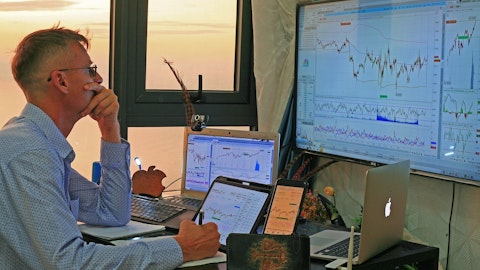Tian Hou: Good morning management. I just have one question. So, look at this quarter, both gross margin and operating margin achieved the record highest level. So, I wonder going forward, if you have a target for those two margins in the long run? Thank you.
Cindy Wang: Thanks. So, there are two major parts of our €“ of our expenses side. One is on the people side. The other is on the sales and marketing. So, on the people side, the total headcount actually remained stable sequentially and even slightly lower in the Q3 on a year-over-year basis. And going forward, we expect our total staff level to remain generally stable, especially for the China domestic business, while the cost per headcount may change according to the performance of the company. On the sales and marketing side, we always follow a very strict ROI-driven investment protocols for our sales and marketing spending. And a large majority of our sales and marketing expenses is discretional. And in the Q3, we actually increased investment in sales and marketing activities in both the China and overseas market just to capture the very strong recovery momentum, especially at the beginning of the Q3.
And our marketing spending in China will swiftly scale down in the second half of the quarter as the travel demand declined due to the emergence of COVID cases and as well as the strict travel control measures. Going forward, we will keep an agile spending protocol and be adaptive to the fast-changing environment just to swiftly capture the recovery opportunities and to retain resources in a tough time. In addition, actually, our improvement on our content offering, our app strategy and cross-selling and technology will also help us to €“ continuously to improve our marketing efficiency, especially in the long run. So, in terms of the operating margins, as we always explained, we think we have a very good business model. And when the business can return to a normal level, we can have a very reasonable and healthy operating margin going back to at least 20% to 30% level.
Thank you.
Tian Hou: Thank you, Cindy.
Operator: Thank you for the questions. The next question comes from Wei Xiong from UBS. Please proceed.
Wei Xiong: Good morning management. Thank you for taking my question. I want to hear your updated thoughts on the domestic competitive landscape because as the domestic travel market is set to recover next year, do we expect the competitive pressure to increase, for example, from other OTAs stepping up subsidies or from potential new entrants into the market? And if that happens, what’s our strategy to defend our market share? Thank you.
Jane Sun: Yes. So, for competitive landscape, I think our focus has always been customer first and our partner second. If we do both well, the results would show itself and we will stand out in the competition. So, what we have seen is a stabilized market with the pandemic, everything is easening out, and the market is very stable. However, we are able to capitalize on the opportunity in a couple of fronts. First of all, the same-city travel and short-haul travel is growing very well. And that is due to the pandemic. A lot of people are turning to travel within short distance in which they have more control. In that segment, our market growth is very strong. We have seen a huge pickup in that segment. Secondly, because of the offer will start shopping platform, we are able to cross-sell products within use.
And that is very efficient in terms of using to up-sell based on their strengths. For example, when they arrive in certain attractions, not only we are able to sell one product based on our understanding of the customer, normally, we will be able to help our partners in certain geographic area to up-sell for these products. And because Trip.com’s level attracts high-end, high-quality customers, we normally are able to help our sales managers to maximize their sales in the region. And thirdly is the engagement of users and customers on site. What we have seen is the enhancement of our product and content attracts more customers on to our site, and the user’s engagement is enhancing as well. If you look at the time they spend on our sites, it’s increasing every year.
And user engagement, the interest for people to do research on our site and use our product to cross-buy different products on sites are also very significant. So, these are the strengths we have. And if we truly listen to our customers and always put their interest first and also help our partners to weather through the storm, we will be able to stand out in the competitive landscape. Thank you.
Wei Xiong: Thank you.
Operator: Thank you for the questions. Our next question comes from Brian Gong from Citi. Please proceed.
Brian Gong: Thanks management for taking my question. Just a follow-up to our overseas business. We have seen some challenges in macro environments in many markets. How should we think about the recovery or growth of our international brands in the fourth quarter and the next year? And how do you think the changing macro environment will change your strategy? And what will be the impact on your spending? Thank you.





